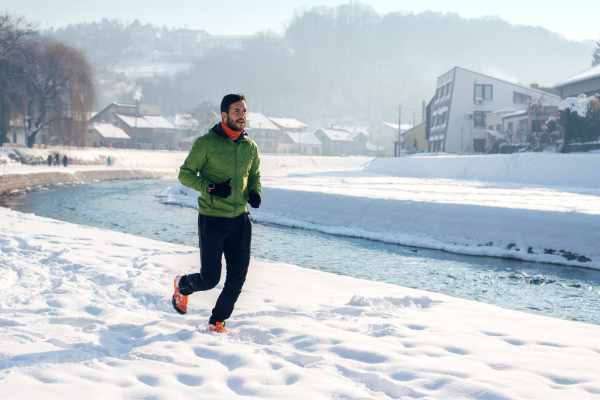Have you ever thought about how your running improves when the weather gets cold? Or are you already convinced and want to prove to your friends how much better running is in cold weather? This post is for you.
See my list of 15 proven benefits of running in cold weather.
Explore Proven Benefits of Running in Cold Weather

1. Burn more calories
Running during winter helps you burn more calories because your body has to work harder to keep warm.
When it’s cold outside, your body has to generate more heat to maintain its core temperature. This process requires energy, which means your body has to burn more calories.
Additionally, it can help you build up your endurance and stamina because your body has to work harder to keep moving.
Also, see waterproof running jackets to keep you warm and dry.
Be sure to check out my latest reviews on the Best Heated Vests for Women.
2. Help you lose weight
Some people find tips for running in winter benefits weight loss.
Additionally, running in 30-degree weather suppresses your appetite, which can lead to eating fewer calories overall.
Of course, running outside in winter is not the only factor that determines weight loss – diet and genetics also play a role.
However, if you enjoy running in freezing weather and find that it supports weight control, then continue to do so.
Don’t let frozen fingers end your outdoor activities early. We tested the best heated gloves for men and women and found battery-powered options delivering 4-8 hours of warmth for $50-$100—especially helpful for anyone with arthritis or Raynaud’s disease.
3. Helps tone your muscles
Running in extreme cold tones your muscles because it forces your body to work harder to keep warm.
When your body is working hard to keep warm, it burns more calories, which can lead to weight loss and muscle definition.
Also, see these snug tops for outdoor sports
4. Improves your cardiovascular health.
Running outside in cold weather raises your cardiovascular health for a few reasons.
First, running in the cold side effects forces your heart to work harder to pump blood to your extremities. This increased work strengthens your heart muscle over time.
Second, cold weather reduces heat stress on the body, making running significantly easier.
Additionally, it improves your lung function. Cold air opens up your airways and makes it easier to breathe.
5. Helps reduce stress levels
The effects of running in very cold weather reduce stress levels for a couple of reasons.
First, it can be a form of meditation. When you’re focused on your breath and the rhythm of your feet hitting the ground, you’re not focused on whatever is stressing you out.
Second, it releases endorphins, which have mood-boosting effects. So even if you don’t feel great when you start your run, you’re likely to feel better by the end.
You may also be interested in the compression undershirts for base layers, or heated vests for men or women.
6. Boosts your immune system
Running below zero boosts your immune system because it builds up your white blood cells.
White blood cells are the cells that fight off infection, so the more of them you have, the better your chances are of staying healthy.
It also improves circulation, which keeps your immune system functioning properly.
7. Increases your energy levels
Running in really cold weather increases your energy levels because it forces your body to work harder to keep warm.
This extra effort means your heart has to pump faster and you breathe more deeply, which gives you an energy boost.
8. Improves your mood
Outdoor running in winter improves your mood because releases endorphins. Endorphins are hormones released by the brain to make you feel happy.
They help with pain relief and boost your mood.
9. Increases your alertness
This increased effort wakes you up and improves focus.
10. Improves your sleep quality
Running in cold temperatures improves your sleep quality for a few reasons.
First, the colder temperature allows you to fall asleep faster.
Second, it allows you to stay asleep longer.
Third, it promotes deep sleep.
Finally, exposure to cooler temperatures minimizes the number of times you wake up during the night.
11. Reduces risk of injuries
Running in below-zero weather reduces your risk of injuries by increasing your circulation and reducing inflammation.
Cold weather running makes your body work harder to keep you warm, which helps to improve your circulation.
12. Increase bone density
Running in sub-freezing temps increases your bone density because the cold weather forces your body to work harder to keep warm. This means your body burns more calories, which leads to weight loss.
In addition, cold weather improves your circulation and the amount of oxygen your blood is able to carry.
13. Reduce the risk of diseases
Running in below-freezing weather reduces your risk of diseases by strengthening your immune system.
When you run in the cold, your body has to work harder to keep warm, which causes your heart to pump faster and your blood vessels to constrict.
This increased blood flow helps deliver more oxygen and nutrients to your cells.
Additionally, frigid temperatures stimulate your immune system and help your body to fight off infection.
14. Prolongs your life
Running in cold rainy weather can help you prolong your life by helping to improve your cardiovascular health and by helping to burn more calories.
Increased cardiovascular activity benefits your overall cardiovascular health and reduces your risk of heart disease.
Additionally, this increased calorie burn allows you to maintain a healthy weight, which can prolong longevity.
15. Makes you feel happier
Cold winter running boosts your sense of happiness because enhances your mood and energy levels.
A chilly weather workout promotes better circulation and breathing, which can also lead to an increased sense of euphoria.
You may also be interested in tights for running in cold weather.
FAQs
Why do my lungs hurt when in running in cold weather?
When you run in the cold, your heart rate and blood flow increase which causes your lungs to expand. This expansion can lead to a sore feeling in the lungs.
If you are experiencing this pain, it may help to take more frequent breaks when running in the cold. Also, try wearing layers to keep yourself warm.
What is the best running gear for cold weather?
The best running gear for cold weather is a combination of layers, but it all starts with your base layer.
Your base layer should be made with wicking fabric, which is designed to pull moisture away from your skin and move it toward the outer layer of the garment.
This keeps you dry, which prevents chills but also helps keep you warm by preventing sweaty buildup.
Can you get sick from running in the cold?
Yes, you can get sick from running in the cold. Running in cold air causes your body to lose heat faster than it can be produced.
This leads to hypothermia, which is when the body’s core temperature drops below 95 degrees Fahrenheit.
It also makes it harder for your body to fight off viruses and germs, which is why running cold weather gear is so important, especially when training in extreme temperatures.
Summary
I hope you found this article – 15 Proven Benefits of Running in Cold Weather. – helpful and interesting. To learn more on this topic see related posts below.

Claudia Faucher is a fitness and lifestyle blogger who shares practical tips for women over 50 on staying active, stylish, and confident. As the creator of FitFab50.com and Beyond59.com, she covers topics like workout gear, beauty trends, and wellness routines. Claudia is passionate about helping others live their best life at any age.
